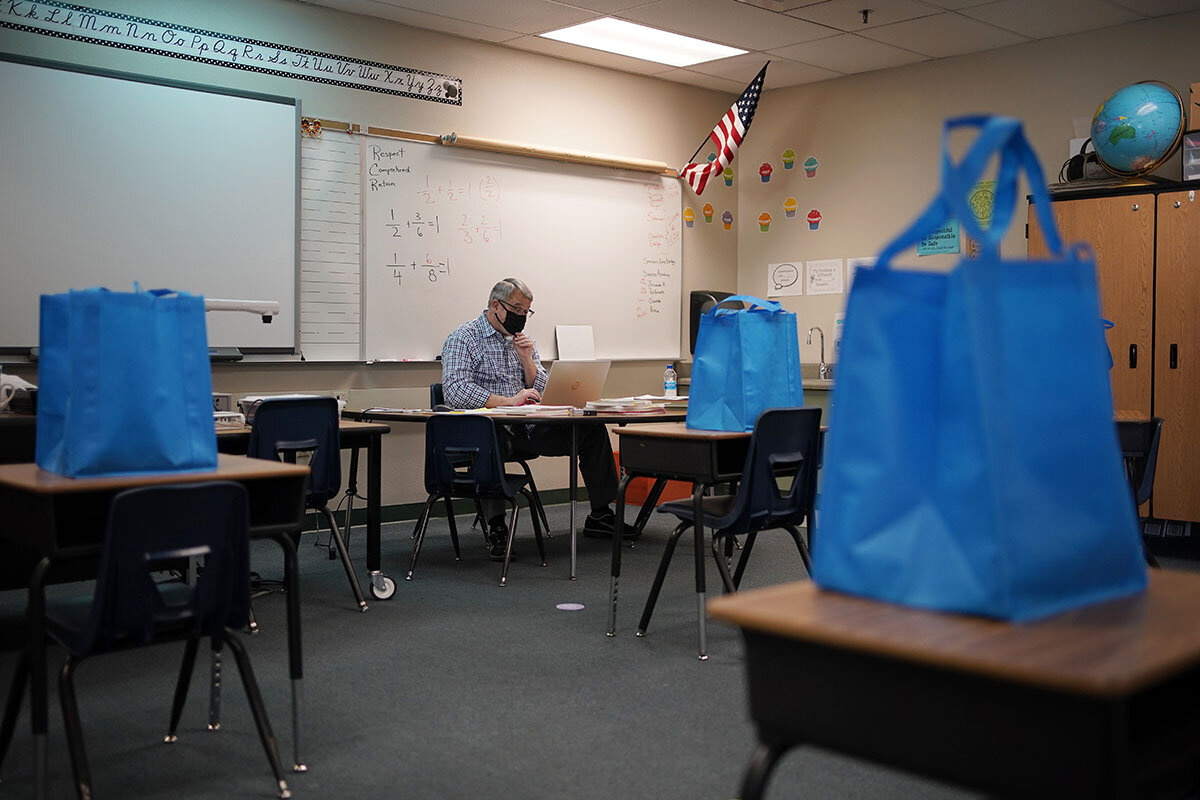Post-pandemic, will the world think big, or just get by?
Loading...
| London
Few ideas have become as familiar in the year since the pandemic erupted than this one: that when it’s over, we will all have learned lessons that will serve to build a new and better world.
With governments poised to spend record sums on recovery, we’re about to find out how true that is.
A trio of core issues that might be called the three E’s – economy, education, ecology – offer litmus tests. Will governments resort to the old, familiar, incremental policy toolbox, or will they adopt a wholly different mindset? In other words, will the challenge of rebuilding inspire far greater policy ambition, bolstered by the political will needed to see it through?
Why We Wrote This
Will world leaders rise to the challenges of building a new world once COVID-19 is behind us? Though preoccupied by immediate economic needs, there are signs that some have learned lasting lessons from the pandemic.
It’s still too early to say which way the balance will tilt. Yet it’s already clear decision-makers are being buffeted by two countervailing forces.
One offers good news for those seeking transformational change: the uniquely seismic effect of the pandemic. It's not just the enormous human and economic costs – the greatest peacetime toll since the flu epidemic of a century ago – nor the global reach, but the fact it's been happening in a world interconnected, in real time, as never before.
The result: unprecedentedly wide awareness of the major policy challenges laid bare by the pandemic, and the breadth of policy changes needed to tackle them.
Yet on the other side of the scale is a major practical obstacle: the difficulty of securing concerted international action when the pandemic has reinforced nationalism and protectionism. There are also shorter-term policy impediments, more in keeping with pre-pandemic politics-as-usual. Chief among them is the imperative to address immediate economic needs and simply get countries up and running again.
On each of the three E’s, the pandemic has acted as a combination of unforgiving stress test and high-powered searchlight. It has brought to the fore deeply rooted problems masked, or ignored, as the world rebounded from the financial crisis of a decade ago.
Economically, for instance, the shutdowns of the past year have highlighted how precarious hundreds of millions of jobs are. Informal laborers in the developing world and gig workers in richer countries, especially those from ethnic minorities, have paid the price.
When it comes to the second E – education – the closure of schools and the spread of remote learning have revealed cracks in the system. In poorer countries, the shutdowns have closed off a vital conduit for advancement, especially for girls. The shift to remote classes has disproportionately caused less advantaged pupils to fall behind or drop out altogether. But the disruptions have also forced a rethink of widespread reliance on rote learning and testing.
On the third E – ecology – the pandemic has dramatically raised awareness. It has reminded us of our dependence on the natural world, while dramatic falls in air pollution as a result of the global economic slowdown have brought home the effect of human behavior on nature. All that amid a series of extreme climate events – most recently, the devastating freeze in Texas – that emphasized the effects of climate change.
As governments around the world plan how to respond, business has begun to send powerful post-pandemic signals that it is preparing for major change.
The U.S. automobile giant, General Motors, has announced it will phase out production of gas and diesel vehicles by 2035. In Europe, Volvo and Volkswagen have set even more ambitious timelines.
Even as U.S. President Joe Biden struggles to raise America’s minimum wage to $15 an hour, Costco, the world’s second-largest retail chain, last week said it would pay its employees a minimum of $16. And some schools and educators have responded to pandemic disruptions by advocating major changes to how they teach, prepare, and care for students.
The question remains whether governments will answer with a step-change in their policies. Will they, for example, follow the advice of many education specialists and rethink schooling and apprenticeship programs to equip young people with the skills required for 21st -century high-tech jobs?
Two major recovery plans – in the U.S. and Britain – have made headlines in recent days. They are both geared largely to ensuring short-term support for pandemic-affected workers and businesses.
Yet one early sign of whether there will be deeper policy changes could come on climate change.
President Biden has pledged a national infrastructure upgrade emphasizing green energy projects. The 27-nation European Union and Britain have also put green initiatives at the heart of their recovery programs.
But if Western nations clean up their economies simply by outsourcing carbon-intensive jobs to countries like China, that does not do the planet any good.
The solution, or so Britain hopes as it prepares to chair a major climate summit later this year to strengthen the Paris climate agreement, would be to secure international agreement on an enforceable path to lower emissions worldwide.
In today’s geopolitical environment, that could prove a tall order.
Yet if it could be achieved, it would pass the test set by another familiar refrain from this pandemic year, “Building Back Better.”







